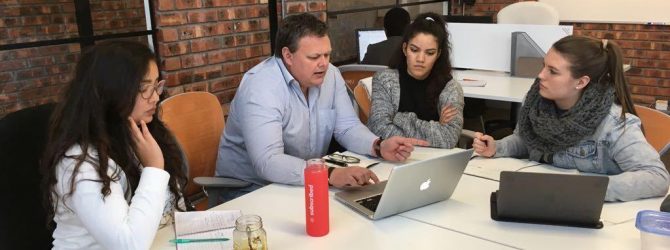Lillian Gabreski is a second year CIPA student who is concentrating on International Development with a specific focus on community development in the U.S. and sub-Saharan Africa. She also serves as the Senior PR Editor for the Cornell Policy Review. Prior to joining CIPA, Lillian graduated summa cum laude from the Pennsylvania State University (16’) and holds an honors degree in Political Science. This summer, Lillie traveled to Cape Town, South Africa where she worked at Eventerprise, a platform that connects people who want to plan events with event suppliers all over the world. In this post, she shares more about her internship experience and her work at Cornell.
When I started looking for summer internships as a first-year CIPA student I knew that 1) I wanted to return to Cape Town, South Africa, and 2) I wanted to try and work with a private company, after focusing the better half of my academic career on the “other side” of the equation (a.k.a. the public and nonprofit sectors). It didn’t take long for me to find a unique opportunity with Eventerprise, a global tech start-up operating in the self-proclaimed “edgy” neighborhood of Woodstock, Cape Town, RSA. I chose Eventerprise because I felt that it had a direct value proposition to small business, and therefore community development, via its promotion of event suppliers of all sizes to a global audience.

At Eventerprise, I served as a Content PostGrad, and worked on creating and marketing content relating to business strategy as well as socially responsible business and women in tech and VC. Much of the focus of my internship surrounded leading the creation and execution of a corporate social responsibility project (Africa’s Got Digital Talent). Part of this project involved conducting meetings with local universities, surveying nonprofits to create a needs assessment, identifying funding opportunities and engaging with stakeholders in the wider South African community.
I’ve always been interested in community development, but near the tail end of my undergraduate career at Penn State University, I decided to learn more about how it could be applied internationally. I had been drawn to the issues surrounding community development in post-apartheid South Africa for several years, so I took an opportunity to enroll in a community development program at the University of Cape Town. I spent half of my time in the classroom and the other half in Manenberg Township, where I worked as a sort of substitute teacher for SHAWCO, filling in for the organization’s regular student teachers who were on holiday at the time.
I came to CIPA knowing I wanted to expand my understanding of community development both in the United States and in sub-Saharan Africa, which is why I chose to focus on international development. Through my coursework at CIPA, I progressively became focused on how engaging the private sector can fuel socio-economic growth. Serving as an intern with Eventerprise gave me the opportunity to see first-hand how private businesses and enterprises can impact and empower localized economic development.
Due to high rates of socioeconomic inequality in South Africa, international interns cannot receive payment in return for services. In addition to receiving
funding from CIPA to sustain me during my three-month internship, I also received funding through the Women’s Leadership Program under Global Cornell. Newly launched in 2017, the program focuses on “developing intercultural and leadership competencies” in female graduate students across Cornell. The support both of these programs offered me was invaluable.
Now in my final year at CIPA, I’m taking advantage of the wide breadth of class options to gain experience in areas such as nonprofit management and finance, consulting, and sustainable business in order to pursue a career in the community development space. My experience working with a private-sector company was nothing but positive, and it has pushed me to look for opportunities to engage across sectors in the future. As we continue to face problems such as strained resources, political disputes, and socioeconomic inequalities, it will be imperative to look beyond our individual arenas to enact and sustain meaningful policy, and I couldn’t think of a better place than CIPA to prepare to help make these partnerships happen.


